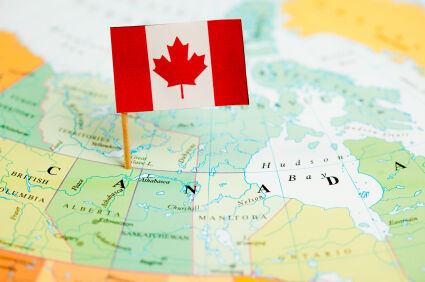
Whether you’re sending a letter or reading a map, it helps to know Canadian province abbreviations. Canada is the world’s second-largest country, based on total area, and it is also one of the wealthiest countries. Its border with the United States is the longest border in the world, and it is a significant force in North American politics. Understanding Canada’s abbreviations can help you understand your world.
Abbreviations for Canadian Provinces
Canada, which has the country abbreviation of CA, is divided into 10 provinces and three territories, for which there are specific abbreviations. For your reference, this Canadian provinces list also includes the land area of each province in square kilometers. You’ll find the postal abbreviation, as well as the common use abbreviations for English and French Canadian.
Alberta
With an area of 642,317 square kilometers, Alberta is located just north of the U.S. state of Montana. It has the following abbreviations:
- AB - Postal abbreviation for Alberta
- Alta. - English abbreviation Alberta
- Alb. - French abbreviation for Alberta
British Columbia
British Columbia, which is located just north of Washington state and also borders Alaska, has an area of 925,186 square kilometers. You can use the following province abbreviations for it:
- BC - Postal abbreviation for British Columbia
- B.C. - English abbreviation for British Columbia
- C.-B. - French abbreviation for Columbia-Britannique
Manitoba
Manitoba has an area of 553,556 square kilometers and borders the U.S. states of North Dakota and Minnesota. It has the following abbreviations:
- MB - Postal abbreviation for Manitoba
- Man. - English abbreviation for Manitoba
- Man. - French abbreviation for Manitoba
New Brunswick
With an area of 71,450 square kilometers, New Brunswick is one of the smaller Canadian provinces. The Maritime province borders the U.S. state of Maine and has these abbreviations:
- NB - Postal abbreviation for New Brunswick
- N.B. - English abbreviation for New Brunswick
- N.-B. - French abbreviation for Nouveau-Brunswick
Newfoundland and Labrador
Labrador is the mainland portion of the province of Newfoundland and Labrador; Newfoundland is an island. Together, they have an area of 373,872 square kilometers. This province is located north of Quebec and has the following abbreviations:
- NL - Postal abbreviation for Newfoundland and Labrador
- N.L. - English abbreviation for Newfoundland and Labrador
- T.-N.-L. - French abbreviation for Terre-Neuve-et-Labrador
Nova Scotia
Nova Scotia is also a smaller province and has an area of 53,338 square kilometers. It’s located west of New Brunswick on Canada’s east coast and has these abbreviations:
- NS - Postal abbreviation for Nova Scotia
- N.S. - English abbreviation for Nova Scotia
- N.-É. - French abbreviation for Nouvelle-Écosse
Ontario
With an area of 917,741 square kilometers, Ontario is located north of the U.S. states of Michigan, Minnesota, and New York. It has the following abbreviations:
- ON - Postal abbreviation for Ontario
- Ont. - English abbreviation for Ontario
- Ont. - French abbreviation for Ontario
Prince Edward Island
The smallest of all the Canadian provinces and territories, Prince Edward Island as an area of only 5,660 square kilometers. It is located near Nova Scotia and New Brunswick. You can use the following abbreviations for Prince Edward Island:
- PE - Postal abbreviation for Prince Edward Island
- P.E.I. - English abbreviation for Prince Edward Island
- Î.-P.-É. - French abbreviation for Île du Prince-Édouard
Quebec
One of the largest provinces and territories, Quebec has an area of 1,356,128 square kilometers and is located north of Maine and several other U.S. states. It has these abbreviations:
- QC - Postal abbreviation for Quebec
- Que. - English abbreviation for Quebec
- Qc - French abbreviation for Quebec
- P.Q. - Unofficial French abbreviation for Province du Quebec
Saskatchewan
With an area of 591,670 square kilometers, Saskatchewan is located north of the U.S. states of Montana and North Dakota. You can use these abbreviations for this prairie province:
- SK - Postal abbreviation for Saskatchewan
- Sask. - English abbreviation for Saskatchewan
- Sask. - French abbreviation for Saskatchewan
Abbreviations for Canadian Territories
Canada also has three territories, each of which have abbreviations of their own.
Northwest Territories
With an area of 1,183,095 square kilometers, the Northwest Territories encompasses a huge area of Canada. It is located north of Alberta, Saskatchewan, and British Columbia and has the following abbreviations:
- NT - Postal abbreviation for Northwest Territories
- N.W.T. - English abbreviation for Northwest Territories
- T.N.-O. - French abbreviation for Territoires du Nord-Ouest
Nunavut
The largest of all the provinces and territories, Nunavut has a total area of 1,936,113 square kilometers. It is located east of the Northwest Territories and north of Manitoba. You can use these abbreviations for Nunavut:
- NU - Postal abbreviation for Nunavut
- Nvt. - English abbreviation for Nunavut
- Nt. - French abbreviation for Nunavut
Yukon
The Yukon is located east of the U.S. state of Alaska and north of British Columbia. It has an area of 474,391 square kilometers and uses these abbreviations:
- YT - Postal abbreviation for Yukon
- Yuk. - English abbreviation for Yukon
- Yn - French abbreviation for Yukon
- YK - Unofficial abbreviation for Yukon
Using Canadian Province Abbreviations
When you mail a letter or package, it’s important to use the postal abbreviations for the Canadian province, just as you would with the abbreviations for US states. However, it’s also helpful to know the common use abbreviations so you can communicate clearly with others when talking about Canada. The more you know about this country and its commonly used abbreviations, the better you’ll be able to make yourself understood.